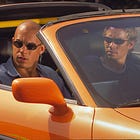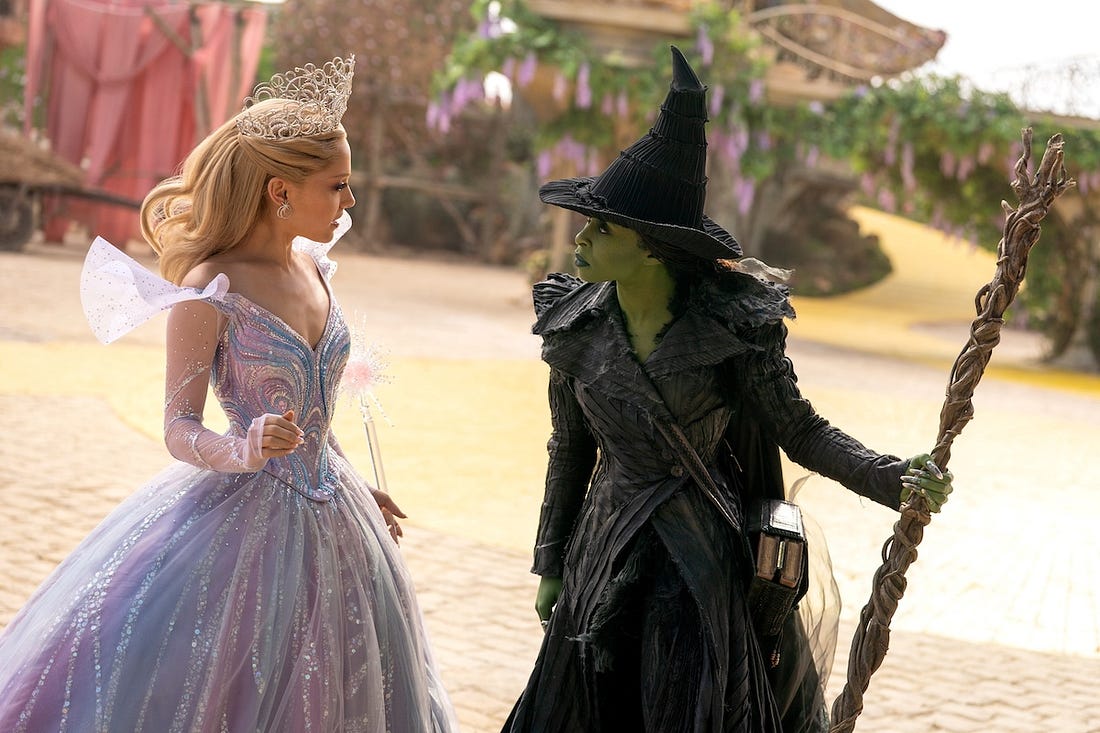|
 |
Longtime listeners/readers will know that I’m not hugely fond of the Fast and Furious movies. But I really enjoyed Barry Hertz’s book on the series, Welcome to the Family, and think that you might as well. Even if you don’t care about the fast-cars-and-family movies, the series as a whole serves as something of a crash course in the economics of Hollywood over the last quarter century, and Hertz nails that evolution in this book.
CARDS ON THE TABLE: Wicked: Part One wasn’t really for me, as I noted in my review, but it had some charming moments and an undeniably infectious and energetic performance from Ariana Grande, who bubbled and blustered her way through the role of Glinda with a sort of catastrophic naïveté. Plus it had some showstopping songs and a couple of delightfully choreographed dance scenes (albeit ones that were overedited in a way that really stripped them of their jaunty power). I didn’t dig it, but I could see why people inclined to dig that sort of thing would.
Wicked: For Good, on the other hand, is a sodden, soggy mess. There’s a hint of an interesting movie just beneath the surface—one that focuses more tightly on the Tin Man, Cowardly Lion, and Scarecrow; a politically minded body horror film reflecting shades of Tetsuo: The Iron Man and David Lynch’s interest in the morbid ugliness beneath the glossier things—but that hint is buried under endless, lifeless songs, an overly dark color palette, and a ham-handed Nazi metaphor that’s tossed in almost as an afterthought.
Picking up a few years after the first film, Wicked: For Good quickly sets the stage. Elphaba (Cynthia Erivo), who has been rebranded the Wicked Witch of the West by the Wizard of Oz (Jeff Goldblum) and his mouthpiece Madame Morrible (Michelle Yeoh), is on the run, doing what she can to aid the oppressed animals of Oz. Glinda (Ariana Grande) nears marriage with Fiyero (Jonathan Bailey), a prince who is still harboring feelings for Elphaba and is distressed that Glinda has gone along with the Wizard and Morrible’s campaign of character assassination. Elphaba’s sister, Nessarose (Marissa Bode), is now in charge of Munchkinland, their father having died of shame at Elphaba’s evil turn; she yearns for the affection of Boq (Ethan Slater), who in turn pines for Glinda.
There are interesting threads to pull here about the nature of the information economy and the sad fact that, ultimately, people want something they can believe in rather than more difficult truths. But the film’s theses can never really gain traction because it is, ultimately, an exercise in box-checking. Here’s where the flying monkeys come from, here’s why the Lion is so cowardly, here’s why the Tin Man has no heart, here’s the horrifying way the Scarecrow gained sentience. And here too there’s a nugget of an idea, the way tragedy can twist people. But this isn’t a movie about Dorothy’s trio of helpers and their understandable rage at the world in which they’ve been trapped by Elphaba.
No, it’s a movie about how Glinda and Elphaba need to be allowed to feel good about themselves no matter how much harm they do to everyone around them.
That solipsism would be fine if the songs that dot the picture were catchy in the slightest (they aren’t; I couldn’t hum a bar of a single tune I heard just hours ago) or if there was some impressive choreography to the showtunes (there isn’t; it’s a weirdly empty movie after the overstuffed aspirations of last year’s Part One, almost as if they blew their whole extras budget on the first film). And you get the sense that director Jon M. Chu and writers Winnie Holzman and Dana Fox know the emotional pull is lacking, hence the bizarrely undercooked subplot about talking animals being like Jews in Nazi Germany that’s tied to nothing in the rest of this movie. It’s just an idea floating in the wind like a bubble carrying a powerless witch.
Unlike the first installment, this movie doesn’t manage to be fun. The whole thing is just a dreary, pointless slog. Again: these movies aren’t really for me. And maybe it’ll be fine fodder for those more inclined to enjoy it; you know who you are. But I didn’t care for it much at all.

